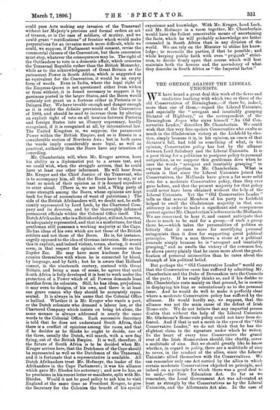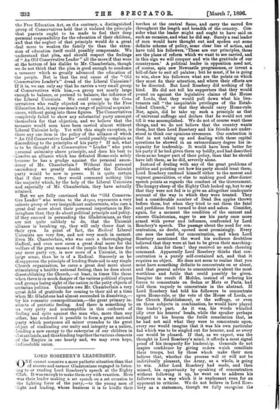THE GRUDGE AGAINST THE LIBERAL UNIONISTS.
WE have heard a great deal this week of the fierce and vindictive loathing with which two or three of the old Conservatives of Birmingham,—if there be, indeed, more than one of them,—regard the Liberal Unionists, and especially the "arrogant and insatiably grasping Dictator of Highbury," as the correspondent of the Birmingham Argus who signs himself "An Old Con- servative Leader, describes Mr. Chamberlain. We could wish that this very free-spoken Conservative who exults so- much in the Gladstonian victory at the Lichfield by-elec- tion, simply because it is, in his opinion, an omen of that dictator's fall, had told us something of what, in his. opinion, Conservative policy has lost by the alliance between Lord Salisbury and the Liberal Unionists. It is‘ a poor thing for a politician to postpone policy to personal antipathies, as we suppose this gentleman does when he uses the words "arrogant and insatiably grasping" to express his objection to Mr. Chamberlain. 'What is certain is that since the Liberal Unionists joined the Conservatives, the Midlands have given a far more solid vote for a moderate Conservative policy, than they ever gave before, and that the present majority for that policy could never have been obtained without the help of the Liberal Unionists. Yet the "Old Conservative Leader" tells us that several Members of his party in Lichfield helped to swell the Gladstonian majority in that con- stituency in order to make a significant and conspicuous protest againstMr. Chamberlain's influence in the Midlands. We are concerned to hear it, and cannot anticipate that there is much to be said for a group,—if such a, group there be,—which takes the personalities of politics so- bitterly that it cares more for mortifying personal antagonists than it does for supporting great political- principles. When a man throws a stone at a political comrade simply because he is "arrogant and insatiably grasping," and so swells the victory of the common foe, he shows pretty plainly that he cares more about the grati- fication of personal animosities than he cares about the triumph of his political belief.
But perhaps the " Old Conservative Leader" would say, that the Conservative cause has suffered by admitting Mr. Chamberlain and the Duke of Devonshire into the Councils' of the party. If he really thinks so, and if his dislike to Mr. Chamberlain rests mainly on that ground, he is unwise in displaying his bias so ostentatiously as to the personal issue. And he would do well to make it perfectly clear where a moderate Conservative policy has suffered by the alliance. He would hardly say, we suppose, that the alliance was not the main cause of the defeat of Irish. Home-rule. We do not believe that any impartial person- doubts that without the help of the Liberal Unionists Mr. Gladstone's Home-rule policy could not have been de- feated. And if that is not a merit in the eyes of the "Old. Conservative Leader," we do not think that he has the slightest claim to the signature under which he writes. In the heart of every true Conservative the grand. rout of the Irish Home-rulers should, like charity, cover a multitude of sins. But we should greatly like to know. whether, in regard to policy, there are a multitude of sins to cover, in the conduct of the allies, since the Liberal. Unionists allied themselves with the Conservatives. We can remember only one Act carried by the allies to which. certain moderate Conservatives objected on principle, and indeed on a principle fcr which there was a good deal to. be said,—the Free Education Act. So far as we remember, the Local Government Act was advocated at least as strongly by the Conservatives as by the Liberal Unionists, and the Allotments Act also. In the case of the Free Education Act, on tie contrary, a distinguished group of Conservatives held that it violated the principle that parents ought to be made to feel their deep versonal responsibility for the education of their children, an that the neglect of that principle would do a great -deal more to weaken the family tie than the exten- sion of education itself could possibly compensate. We -understand that plea, and should respect the feelings of "An Old Conservative Leader" all the more if that were at the bottom of his dislike to Mr. Chamberlain, though we do not think that the plea is good enough to condemn a measure which so greatly advanced the education of the people. But is that the real cause of the "Old Conservative Leader's" dread of the Liberal Unionists ? If it is, we can only say that he carries a very small group .of Conservatives with him,—a group not nearly large enough to balance, or pretend to balance, the influence of the Liberal Unionists. We could count up the Con. 'servatives who really objected on principle to the Free Education Act, in anyone man's range of political acquaint- ances, without going into three figures. The Conservatives completely failed to show any substantial party amongst themselves for that objection, and we believe that the measure would soon have been carried almost without liberal Unionist help. Yet with this single exception, is there any one item in the policy of the alliance of which An Old Conservative Leader" could possibly complain as discrediting to the principles of his party ? If not, what is to be thought of a Conservative " Leader " who puts personal animosity above principle, and does his best to .(lissolve an alliance which has defeated Home-rule solely because he has a grudge against the personal ascen- dency of Mr. Chamberlain ? Without that personal ascendency we greatly doubt whether the Unionist .party would be now in power. It is quite certain that if they were, they would command nothing like the majority which, by the help of the Liberal Unionists and especially of Mr. Chamberlain, they have actually attained_ But we are fully convinced that the "Old Conserva- tive Leader" who writes to the Argus, represents a very minute group of very insignificant malcontents, who care a great deal more about their personal importance in Bir- mingham than they do about political principle and policy. If they succeed in persuading the Gladstonians, as they are not quite unlikely to do, that the Unionist alliance is breaking up, they will only throw dust in their eyes. In point of fact, the Radical Liberal Unionists are very few, and not very much in earnest. Even Mr. Chamberlain, who was once a thoroughgoing Radical, and even now cares a great deal more for the welfare of the great masses of the people than he does for any mere party cry, is now more of a Unionist, in the large sense, than he is of a Radical. Sincerely as he disapproves the principle of lending State-aid to any single Church organisation, he cares a great deal more about stimulating a healthy national feeling, than he does about disestablishing the Church,—at least, in times like these when there is so much danger of the various political cliques und groups losing sight of the nation in the petty objects of ooctarian politics. Unionists owe Mr. Chamberlain a very great debt of gratitude for coming to their aid at a time when Mr. Gladstone had almost succeeded in dissolving,— ,by his romantic cosmopolitanism,—the great primary in- stincts of patriotic feeling. And there is something to us very petty and contemptible in this outburst of feeling and spite against the man who, more than any other, has rendered it possible to form a great national party which postpones all minor crusades to the great object of vindicating our unity and integrity as a nation, -lending a new energy to the enterprise of our children in distant lands, and thus binding together the various elements • of the Empire in one hearty and, we may even hope, :ndissoluble union.







































 Previous page
Previous page